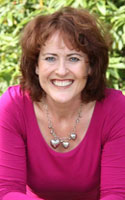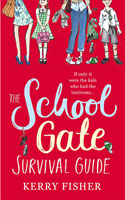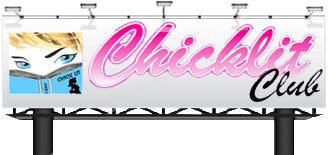INTERVIEW
August 2014

KERRY FISHER
Kerry Fisher worked as an English teacher in Corsica and Spain before training as a journalist in England. After two years working at Essentials magazine in London, love carried her off to the wilds of the West Pennine moors. She now lives in Surrey with her husband and two children. Her first novel, The Class Ceiling, has been republished by Avon as The School Gate Survival Guide. (Interview by Jody Hoekstra)
Return to interview list
-

1. Tell us about your novel, The School Gate Survival Guide?
The School Gate Survival Guide is a funny novel about school gate snobbery. It’s about a cleaner, Maia Etxeleku, who receives an inheritance that can only be used to send her children to a posh private school. She suddenly finds herself catapulted into a middle-class minefield of organic apricots, Pilates classes and women whose biggest drama is having to wait in all morning for a John Lewis delivery. But it’s not just about snobbery: the power of friendship, the quirkiness of romance and the ups and downs of motherhood are all intertwined.
-
2. Where did you get the inspiration for your novel?
After living in Italy where snobbery tends to be confined to job title and regional superiority (the northern Italians see themselves as higher in the social hierarchy than southern Italians), I realised that those two affectations were just the beginning in Britain. I’ve never lived anywhere in the world where the way you cut a piece of cheese or the word you use for the room where the telly is (sitting room, lounge, front room) can somehow denote your social class! Once I saw the comedy value in that concept, I thought that the school gates would be a perfect environment to explore the idea further.
-
3. What is the main protagonist, Maia, like?
Maia lives with her feckless partner, Colin, and her two children, Harley and Bronte. She doesn’t care about her own deprivations as long as she can make things right for her children, which I think is a trait many women can relate to. She’s feisty, funny and irreverent but utterly genuine – the sort of person who appeals to me in real life.
-
4. There’s a great cast of supporting characters as well. Which character did you most enjoy writing?
I loved writing Clover, who’s a trust fund hippie and chaotic mother. She’s never picked up a duster in her life and doesn’t mind the pet rabbits and swearing parrot roaming freely in her house. She’s the person I’d like to be if I wasn’t so buttoned-up … she couldn’t give a hoot what people think about her but has a great big heart and huge generosity of spirit.
-
5. What’s your personal opinion when it comes to school gate politics?
I’ve made some great friends with the mums at my kids’ schools – but of course, it’s much less interesting to read about harmony and joy than intrigue and backstabbing – so I’ve probably portrayed school gate politics as far more exciting and dramatic than they’ve been in my experience. That said, I do know a few mums who take giving their child every opportunity in life to the extreme – I think we’ve all met some poor ten-year-old being rushed to trombone, tennis, karate and Mandarin lessons with no sugar-free, water-only moment left unturned.
-
6. What do you hope readers take from the book?
I hope that readers find it a funny, feel-good read but if I were looking to deliver a deeper message, it would be to give people a chance – lots of people seem aggressive or unpleasant because they are trying to cover up their own insecurities. Though I don’t think that’s what most readers take away from the novel – by far the most frequent comment is ‘Where can I find a Mr Peters?’ (He’s the love interest in the book!)
-
7. Are you working on another novel?
The ebook of The School Gate Survival Guide is out already but I’m gearing up for the paperback launch on 11 September. I still want to do a little dance and hug the dog when I think about it. Avon are already polishing up my next novel, The Divorce Domino, ready for publication next summer. I’m about three-quarters of the way through my new book – I’m at that terrifying stage where I don’t know whether I have 75,000 words fit for publication or guinea pig bedding.
-
8. Do you have any tips for aspiring writers?
I offer advice here as an author whose rejections could probably keep every toddler group in Surrey in scrap paper for several years to come. So my top tip is persevere. But as well as that, write a set amount of words every day, (even if it’s only 100). Accept that unless you are a genius, you’ll have to learn your craft which means taking classes, reading books about writing, listening to authors speak and attending literary festivals and workshops. Be willing to ‘hear’ the feedback from sources you trust. It’s human nature to reject anything negative but don’t just dismiss unfavourable comments out of hand in an emotional kneejerk reaction. You’ll make much quicker progress if you are prepared to assess objectively if they is any truth in what they say.
-
9. What is the last book you read that you’d like to recommend to others?
The Lie of You by Jane Lythell. I’ve lived abroad a lot and this psychological thriller appealed to me because it was about two women with different cultural backgrounds – a warm, vulnerable mother of Portuguese heritage who finds herself undermined at work (and chillingly, in other areas of her life) by the cool determination of a woman of Nordic descent.
-
10. Which book could you not live without?
It’s not exactly a rip-roaring read but taps right into my need to get every hyphen and capital right - you can’t beat the New Oxford Dictionary for Writer and Editors! But in terms of novels, I find The Help by Kathryn Stockett hard to beat as she underlines the seriousness of racism through humour, which is a tricky act to pull off.
-
11. And last but not least, if you had to describe The School Gate Survival Guide in just three words, which words would you pick?
Funny, real, feel-good.
